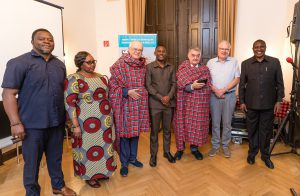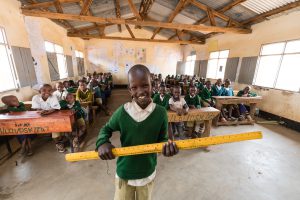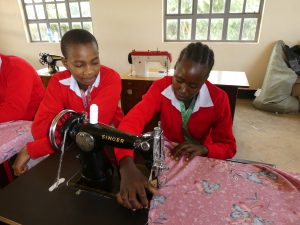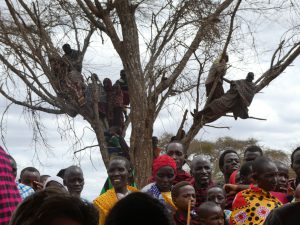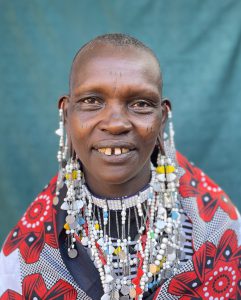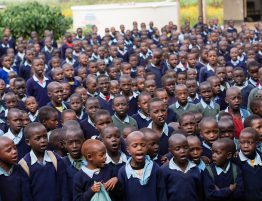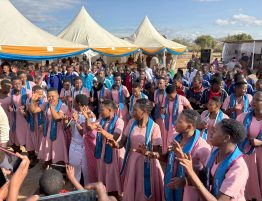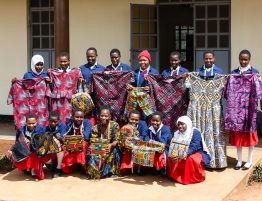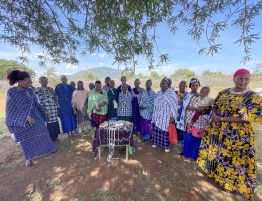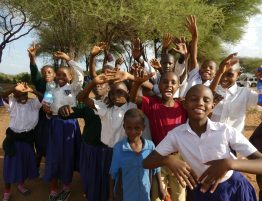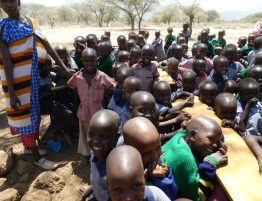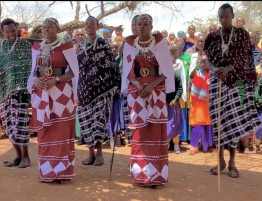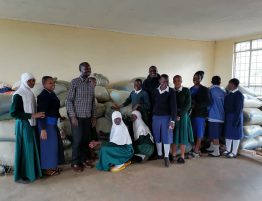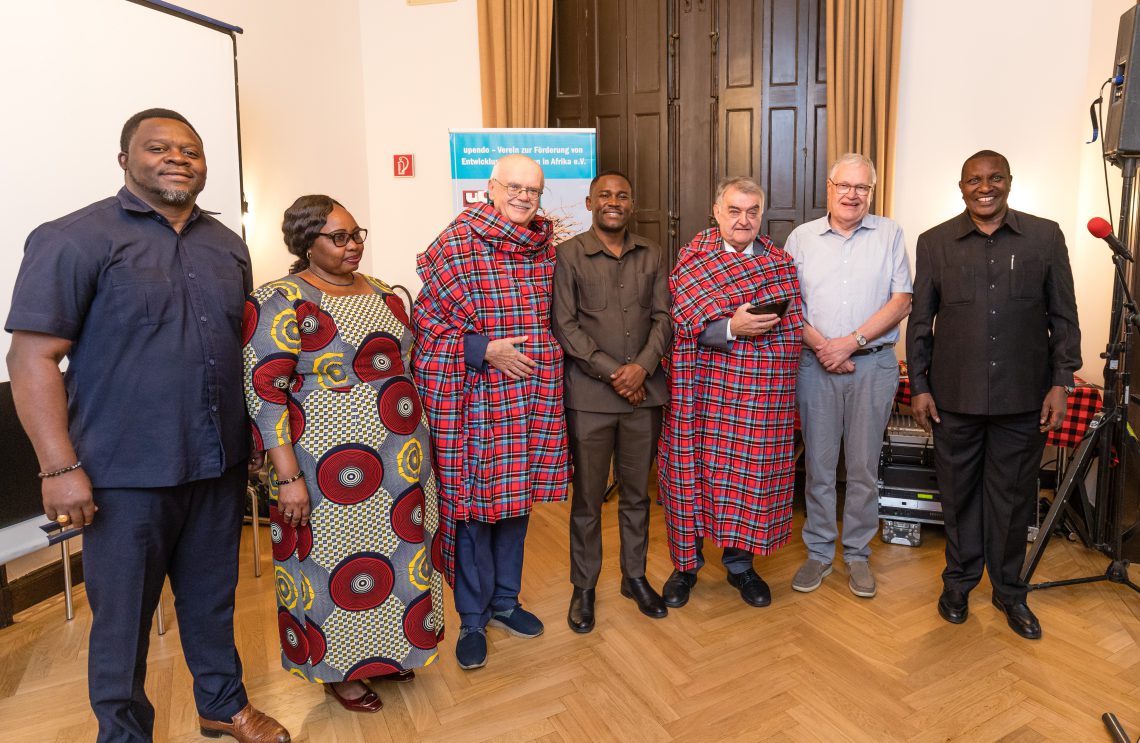
In 2023, we have once again implemented all of the projects in Tanzania as planned and we can look back on the past year with gratitude. This includes our commitment to developing schools as well as capacity building projects such as women’s work and family planning.
Information event of upendo
On 16 September 2023, we had the opportunity again to report on the work we do to our friends at an information event. The District Commissioner of the Simanjiro District, Dr Suleiman Serera, and the District Executive Director Gracian Makota stayed in Germany during this time and commented on our work from the perspective of the Tanzanian government. Toima Kiroya, head of our partner organisation ECLAT, outlined the projects and the underlying background. The guest of honour at the event was the patron of upendo, Minister Herbert Reul. Many of our friends received an in-depth and impressive report that afternoon about what we are doing in Tanzania, the acceptance of our work in the country and its far-reaching effects.
School expansion
Last year, in addition to the new dormitory for girls at the secondary school in Emboreet, we were in a position to also hand over 10 primary school projects to the Tanzanian government, which runs the schools. Some schools were renovated, others expanded and some were built entirely new. More on this will follow in the annual upendo report in the coming months. We could see that our commitment to improving school education in the Simanjiro district in recent years is bearing fruit: The proportion of children of school age who were not attending school according to the 2022 census was 28%, as assessed by the district administration. Just a few years ago, the figure was estimated to be at least 70%. The reasons for the significant improvement in school attendance are manifold and cannot be attributed solely to our commitment, but our commitment was a contributing factor. Not all children go to school yet and the classes are still far too overcrowded with often 100 children or more in one room. However, the attendance figures encourage us not to let up.
Women’s work
We were able to supplement the women’s work in ECLAT’s seminar centre and in the villages with a new pilot project for teenage girls who have not qualified for further education in the Tanzanian school system. As an alternative to a forced marriage in their teenage years, they learn handicraft skills in a two-year course at the seminar centre, which will enable them to achieve a certain degree of independence in their later lives. It is a rewarding experience to see how the girls have blossomed in just six months, how enthusiastically they take up this training opportunity and how they participate.
ECLAT’s work with women over the past few years is also clearly bearing fruit – even if it is not as measurable in figures as children’s school attendance. Meetings of women’s groups are now a part of the daily routine and their economic commitment is accepted and visible everywhere in the villages. This would have been unthinkable just a few years ago. In the interview on the back page of this information letter, one of the women talks about the importance of women’s work in her life. She never went to school herself, but her expectations for her daughter’s life show the importance she attaches to education in her children’s lives. She clearly communicates that ECLAT is on the right track with women’s work and encourages us to continue.
Family planning
In Maasai culture, the men are proud of having many children, even if they do not look after them themselves. Raising the children is the task of the women, who are struggling to feed and care for their many children. This is why since 2022 ECLAT has been running family planning campaigns in the villages, which are primarily aimed at men. ECLAT carries out these campaigns together with the traditional leaders who support our appeal. As the state provides family planning resources free of charge, ECLAT also co-operates with the health centres. Couples can obtain family planning resources there. The campaigns are very well received. Many seek counselling and contraceptive treatment. More and more villages are approaching ECLAT to organise family planning campaigns in their villages too, far more than ECLAT can currently provide. upendo and ECLAT are currently examining in detail whether and how we can meet this demand. More and more Maasai are realising that they only have a future for themselves and their families if they accept education and give their children the chance of a life free from poverty and economic disadvantage.
Final word
In addition to mentoring student craftsmen and the water projects, we have also been able to continue our environmental and nature conservation-related projects with the PAMS Foundation in 2023. This concerns the education of youths at the secondary schools east and west of Tarangire National Park as well as the protection of the elephant corridor at the Ngorongoro Crater. We will again present these projects in detail in the 2023 Annual Report.
Report by a woman from the Esupat group on the importance of ECLAT’s work for women for her life
Not all children go to school yet and the classes are still much too overcrowded with often 100 children or more in one room.
My name is Kachai Laandare. I am 45 years old. I am married as a second wife with six children two girls and four boys. I live in Emboreet Village. I am an active member of Esupat group which received the Grinding Machine as an economic project. The group also has a Soap Making Project.
Before I joined ECLAT I was mainly a housewife concerned mostly with keeping livestock and ensuring milking of cattle is done for my children to get milk. My lifestyle was not one to envy, it was not good at all, I was without knowledge and network. After joining ECLAT through the Esupat Women Group, I can say I got something good in my life and I am empowered. There are many trainings that have been done to our group that have helped me to bring development to my family. I am an ambassador to assist other women join development groups, get family development and be free from dependence. I understood the need for personal hygiene and started insisting on cleanliness to my children, my house and environment. I also have started a small business selling grocery items like sugar from the profit received from the maize flour project. I am also good at bead making and very active in my Village Savings and Loans Associations (VSLA) where I save and receive soft loans to support my businesses. I am really looking forward to educate my youngest daughter who is still in primary school. At least she will be able to bring a change to her own life and family in future.
(The interview was conducted and summarised by Catherine Maguzu in September 2023).
Photos: Bernhard Becker, Rüdiger Fessel, Fred Heimbach
Layout: Heike Ponge
Translation newsletter (German-English): Marita Sand

